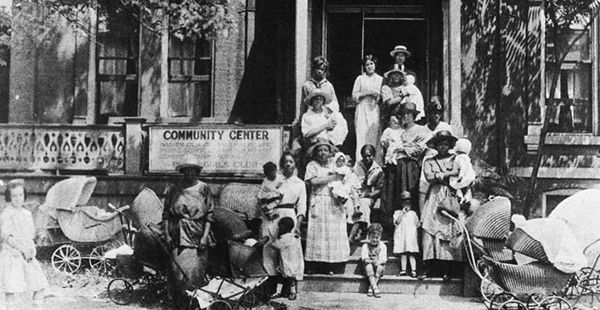VCU public health expert shares insights on citizen action and health care reform
June 30, 2017
On the national stage and in local conversations, health care reform has been a hot topic this summer. The debate and uproar are not new, according to a VCU expert on health care policy.
Andrew Barnes, Ph.D., and assistant professor of health behavior and policy at VCU discussed the history of health care and how it relates to today’s policymaking. His talk was part of the National Library of Medicine’s “For All the People: A Century of Citizen Action in Health Care Reform” exhibit at Tompkins-McCaw Library for the Health Sciences. The exhibit explores how health care reform has been a contentious political issue in the United States for more than 100 years.
Barnes sat down with a lunchtime crowd to talk about the beginnings of organized health care and how it evolved over the last century into the current system. He discussed the earliest forms of organized health care that sprung from rapid industrialization and population boom. Employers began providing some sick leave or health coverage for employees in the early 20th century.
However, health care has always been an issue for the poor and marginalized. The fight for health care for those who need it has been common in United States history. Barnes said that citizen action was a route to reform.
Today, he says, “There’s a re-engagement with citizens and their government right now so the pendulum is swinging, but it takes time.” said Barnes who encouraged people to consider becoming active. “Call your representatives...get involved to the extent that you want to. If there’s something you want to see changed, find like- minded people and work with them. Have your voice heard.”
Barnes touched on the current state of health care policy and on the contentious process of passing a bill into law. On the differences between the Affordable Care Act and the proposed American Health Care Act, Barnes said, “The American Health Care Act essentially does a lot to repeal the Affordable Care Act.” These changes would include removal of the individual mandate, changes to penalties, limitations to Medicaid and state waivers for coverage protections.
“There’s a distaste for public coverage programs in the current majority party,“ said Barnes, “so the extent that there are pieces of legislation that would rely on public coverage options, I expect them to be withheld.”
Also during the talk, Barnes outlined the timeline of health care reform from the Great Depression to Franklin D. Roosevelt’s resulting attempts to pass national health reform. Barnes then traced the evolution of policy through the Civil Rights era, onward to the beginning of Medicaid and Medicare, then leading to the modern era.
After the discussion, Dr. Barnes answered questions from the audience. Questions ranged from the effects of current health care reform on the VCU Health Community to the opinions of medical practitioners on shaping policy. When asked about health care policy as a component of medical school curriculum, Barnes said, “It is implemented in other schools, but not here at VCU. I’m not sure why. Learning to properly navigate and understand health care policy could definitely benefit both practitioners and patients alike.”
The exhibit continues to be on view during regular library hours through August and Barnes’ talk is available on Facebook.
This article was written by K.J. Ricasta, VCU Libraries PR Intern.
< Previous Next > Chat
Chat